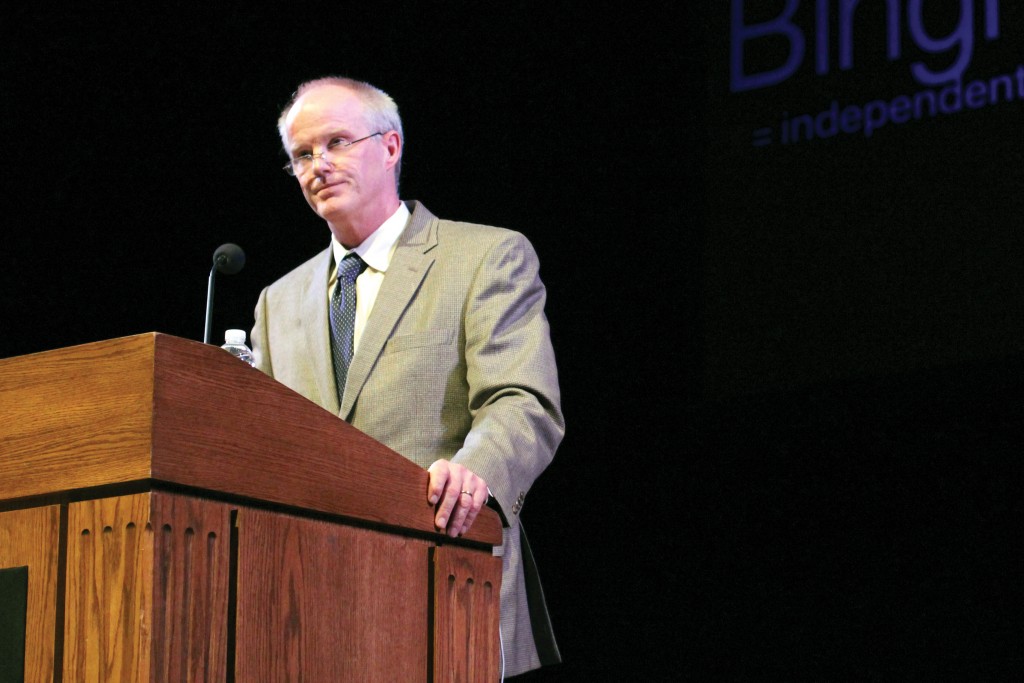
Renowned speakers of diverse backgrounds presented “ideas worth spreading” on Sunday at Binghamton University’s second TEDx event.
Videos of each speaker are currently being edited and will be online in two weeks.
This year’s TEDx, titled “From Insight to Impact,” was held from 2 to 6 p.m. at the Osterhout Concert Theater in the Anderson Center. The event featured seven speakers in two sessions divided by an intermission.
TEDx is a division of the TED organization, a non-profit company that organizes a series of international conferences aimed at spreading new ideas in the fields of technology, entertainment and design.
The independently organized TEDx events are intended to present the TED mentality to local communities. The events must be approved by TED and feature a combination of guest speakers and TED videos from the TED website.
The speakers covered topics ranging from Buddhist meditation to global politics.
The first block of the event featured: Suzanne Seggerman, co-founder and former president of Games for Change, a non-profit organization focused on the use of video games for social change; Sharon Salzberg, co-founder of the Insight Meditation Society, a non-profit organization for the study of Buddhism; BU alumnus Owen Pell, an international human rights litigator and lawyer; and Steven Kurtz, an artist and professor from SUNY Buffalo.
The speakers following the intermission were: Al Biles, a musician and professor in the department of interactive games and media at RIT; Leigh Ann Wheeler, an associate professor of history at BU; and University President Harvey Stenger.
According to Lenny Simmons, founder and executive director of TEDx Binghamton, the diversity of topics presented at the event was intended to draw in students from a variety of backgrounds.
“We try to have a diverse range of topics so that every student will find at least one thing interesting and then they might get interested in new topics by listening to the other speakers,” Simmons said.
The speakers were selected based on recommendations made to the organizers.
The event was largely funded and organized by BTV, according to Alex Kleiner, president of TheNewBTV and a senior majoring in computer science. Kleiner said BTV spent more than $2,500 on the two TEDx Binghamton events.
BTV recorded all of the speakers — the videos are currently being edited and will be put on the TED website, on the BTV website and on Youtube in two weeks.
“As head of BTV, I used my crew and station as resources for hosting and providing technology and resources for the TEDx event,” Kleiner said. “We essentially set up all the technicalities of TEDx.”
Kleiner said the event, overall, was a great success.
“We felt that it was an outstanding event,” Kleiner said. “We got incredible speakers and they presented on incredible topics. And the turnout was fantastic, we sold a lot of tickets. It was also incredible to meet the mayor of the city, who came to the event, and have the president speak at the event. We were really privileged to get that opportunity.”
Stenger was the last presenter. His lecture was titled “The Cloud-Grant University: When Higher Education Meets High Tech.” Stenger remarked on the importance of accommodating students with technology.
Stenger spoke with Pipe Dream about TEDx and his lecture.
“They gave me the opportunity to pick what I wanted to speak about and I wanted it to be relevant to something I am passionate about,” Stenger said. “At the same time I wanted it to be something people could learn about me, because people are still trying to learn about me as I’m learning about them.”
“They’re ready to roll,” said Stenger, regarding next year’s BU TEDx event.
Sander Ovshey, a sophomore majoring in bioengineering who attended TEDx, said he enjoyed the event.
“I liked it,” Ovshey said. “It was both entertaining and educational. Some of the presenters were better than others. Like the diplomacy 2.0 guy. And they kept having tech problems. The PowerPoints kept on not working. It was bad for the art guy because he couldn’t show us his stuff, but had to explain.”
— Anthony Fiore contributed to this report.


